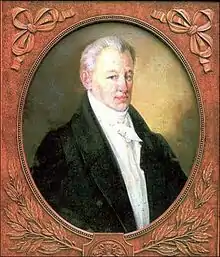Ivan Kotliarevsky
Ivan Petrovych Kotliarevsky (Ukrainian: Іван Петрович Котляревський) (9 September [O.S. 29 August] 1769 in Poltava – 10 November [O.S. 29 October] 1838 in Poltava, Russian Empire, now Ukraine) was a Ukrainian writer, poet and playwright, social activist, regarded as the pioneer of modern Ukrainian literature.[1] Kotlyarevsky was a veteran of the Russo-Turkish War.
Ivan Kotlyarevsky | |
|---|---|
 | |
| Born | August 29, 1769 O.S. (September 9, 1769 N.S.) Poltava, Russian Empire (now Ukraine) |
| Died | October 29, 1838 (aged 69) O.S. (November 10, 1838 N.S.) Poltava, Russian Empire (now Ukraine) |
Biography
Kotlyarevsky was born in the Ukrainian city of Poltava in the family of a clerk Petro Kotliarevsky of Ogończyk Coat of Arms.[2][3] After studying at the Poltava Theological Seminary (1780–1789), he worked as a tutor for the gentry at rural estates, where he became familiar with Ukrainian folk life and the peasant vernacular. He served in the Imperial Russian Army between 1796 and 1808 in the Siversky Karabiner Regiment. Kotlyarevsky participated in the Russo-Turkish War (1806–1812) as a staff-captain (something of 1LT or junior CPT) during which the Russian troops laid the siege to the city of Izmail. In 1808 he retired from the Army. In 1810 he became the trustee of an institution for the education of children of impoverished nobles. In 1812, during the French invasion of Imperial Russia he organized the 5th Ukrainian Cossack Regiment in the town of Horoshyn (Khorol uyezd, Poltava Governorate) under the condition that it will be left after the war as a permanent military formation. For that he received a rank of major.[4]
He helped stage theatrical productions at the Poltava governor-general's residence and was the artistic director of the Poltava Free Theater between 1812 and 1821. In 1818 together with Vasyl Lukashevych, V.Taranovsky, and others he was the member of the Poltava Freemasonry Lodge The Love for Truth (Ukrainian: Любов до істини).[5][6] Kotlyarevsky participated in the buyout of Mikhail Shchepkin out of the serfdom. From 1827 to 1835 he directed several philanthropic agencies.[4]
The first modern Ukrainian writer

Ivan Kotlyarevsky's mock-heroic 1798 poem Eneyida (Ukrainian: Енеїда), is considered to be the first literary work published wholly in the modern Ukrainian language.[1] It is a loose translation of an earlier poem Eneida travestied (Russian: Вирги́лиева Энеи́да, вы́вороченная наизна́нку) published in 1791 by the Russian poet N. P. Osipov, but his text is absolutely different. Although Ukrainian was an everyday language to millions of people in Ukraine, it was officially discouraged from literary use in the area controlled by Imperial Russia. Eneyida is a parody of Virgil's Aeneid, where Kotlyarevsky transformed the Trojan heroes into Zaporozhian Cossacks. Critics believe that it was written in the light of the destruction of Zaporizhian Host by the order of Catherine the Great.
His two plays, also living classics, Natalka Poltavka (Natalka from Poltava) and Moskal-Charivnyk (The Muscovite-Sorcerer), became the impetus for the creation of the Natalka Poltavka opera and the development of Ukrainian national theater.
Where the love for the Motherland inspires heroism, there an enemy force will not stand, there a chest is stronger than cannons.
(Любов к Отчизні де героїть, Там сила вража не устоїть, Там грудь сильніша од гармат.)
Legacy
- The Kharkiv National University of Arts 'L P Kotlyarevsky', in Kharkiv, Ukraine, is named after him.
- Monument to Kotlyarevsky was erected by Fedir Lyzohub in Poltava
- Numerous boulevards and streets in Ukrainian cities are named after the poet, the largest ones being in Kyiv, Poltava, Chernihiv, Vinnytsia, Khmelnytsky, Chernivtsi, Pryluky, Lubny and Berdychiv.
English translation
Partial translations of Eneyida date back to 1933 when a translation of first few stanzas of Kotlyarevsky's Eneyida by Wolodymyr Semenyna was published in the American newspaper of Ukrainian diaspora Ukrainian Weekly on October 20, 1933.[9] However, the first full English translation of Kotliarevsky's magnum opus Eneyida was published only in 2006 in Canada by a Ukrainian-Canadian Bohdan Melnyk, most well known for his English translation of Ivan Franko's Ukrainian fairy tale Mykyta the Fox (Ukrainian: Лис Микита).
Еней був парубок моторний |
Aeneas was a lively fellow |
| —Ivan Kotliarevsky - Eneyida | —Translation by W. Semenyna |
List of English translations:
References
- "Eneyida | work by Kotlyarevsky". Encyclopedia Britannica. Retrieved 2020-05-30.
- Літературна панорама. 1988 Текст : збірник. Вип. 3 / упоряд. Г. М. Сивокінь. – К. : Дніпро, 1988. – 270 с. – 1,30.
- "Малоросійська шляхта" мала більше прав і вольностей, ніж російські дворяни
- Ivan Kotliarevsky. Eneida: Excerpts. Translated by Andrusyshen C. H & Kirkconnell W. in the anthology The Ukrainian Poets 1189–1962. Archived 2012-03-09 at the Wayback Machine Published for the Ukrainian Canadian Committee by the University of Toronto Press in Toronto, 1963.
- Sliusarenko, A. H., Tomenko, M. V. Istoriia Ukrainskoi Konstytytsii, "Znannia", (Ukraine 1993), ISBN 5-7770-0600-0, pg. 38 (in Ukrainian)
- List of freemasonry lodges in Ukraine Archived 2011-04-08 at the Wayback Machine (in Ukrainian)
- "Quote by Іван Котляревський: "Любов к Отчизні де героїть, Там сила вража не ..."" (in Ukrainian).
- Олександр Палій. "Чому "вороженьки" бояться пам'яті героїв Крут?". unian.net (in Ukrainian).
- "1933" The Ukrainian Weekly 1933-03.pdf (in English)
- Wawryshyn, Olena. "Melnyk's Monumental Task". www.infoukes.com. Retrieved 2020-05-30.
- "ШТРИХИ ДО ПОРТРЕТА ПЕРЕКЛАДАЧА БОГДАНА МЕЛЬНИКА". Кримська Свiтлиця. Retrieved 2020-05-30.
- Eneïda. worldcat.org. OCLC 62253208.
External links
| Wikimedia Commons has media related to Ivan Kotlyarevsky. |
| Wikisource has original text related to this article: |
- Ivan Kotlyarevsky in Encyclopædia Britannica
- Ivan Kotliarevsky in Encyclopedia of Ukraine
- Works by Ivan Kotliarevsky for reading online in Ukrainian
- Eneyida - a living classic of Ukrainian literature in Welcome to Ukraine, 1999, 1
- Excerpts from Eneyida (translated into English)
- Text of Eneyida (in Ukrainian)